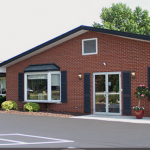Interest rate volatility is back in the picture for borrowers looking to finance real estate projects of all kinds, including senior housing/healthcare properties.
Cambridge Realty Capital Companies Chairman Jeffry A. Davis says long-term, 10-year U.S. Treasuries have increased more than 120 basis points since November 9, 2016, when Donald J. Trump emerged as the surprise winner in an election campaign that exposed deep divisions in the nation’s body politic. (A basis point is 1/100th of one percent).
“Rate volatility had been a non-factor since the Great Recession of 2008, but is now front and center for all types of real estate. This especially applies to skilled nursing homes and post-acute facilities, as these businesses routinely are given a wide berth in traditional real estate capital markets,” he said.
Cambridge is one of the nation’s leading senior housing/healthcare lenders. Mr. Davis says popular HUD loans address the needs of senior housing/healthcare industry borrowers for whom conventional financing is not an option.
“HUD will become even more popular in the current rising interest rate climate, perhaps more so than at any time over the past 25 years,” he predicts. This is due to many factors and benefits from the HUD program; most important are a competitive, long-term interest rate, 30-year term and amortization, and 80% LTV.
A number of related factors are conspiring to push interest rates higher, he observes.
For one thing, the new President campaigned for major infrastructure spending to further stimulate the economy.
Another concern involves the tax cuts President Trump is touting, which will significantly reduce the government’s revenue and ability to pay its bills, Mr. Davis said.
The Cambridge Chairman further notes that the new President’s ideas for stimulating the economy are diametrically opposed to the more measured approach favored by the Federal Reserve Board. Conceivably, the push-back on these conflicting approaches could result in even more upside pressure on interest rates.
“With a Republican majority in control of the House, Senate and Executive branch, the elimination of gridlock in Washington may take place. This development could contribute to rising rates as well,” he added.
But Mr. Davis says higher borrowing costs may not turn out to be the senior housing/healthcare industry’s biggest concern in the New Year. President Trump and other Republicans have campaigned vigorously for the repeal and replacement of Obamacare, which may mean that significant changes to Medicaid are in the offing.
“Over the past eight years, the Obama administration has been extremely accommodating to Medicaid,” Davis said.




